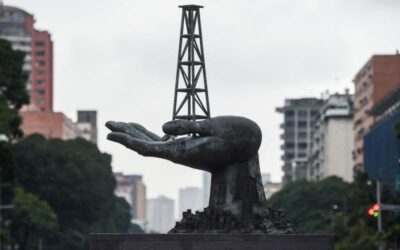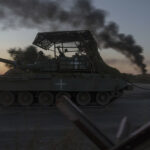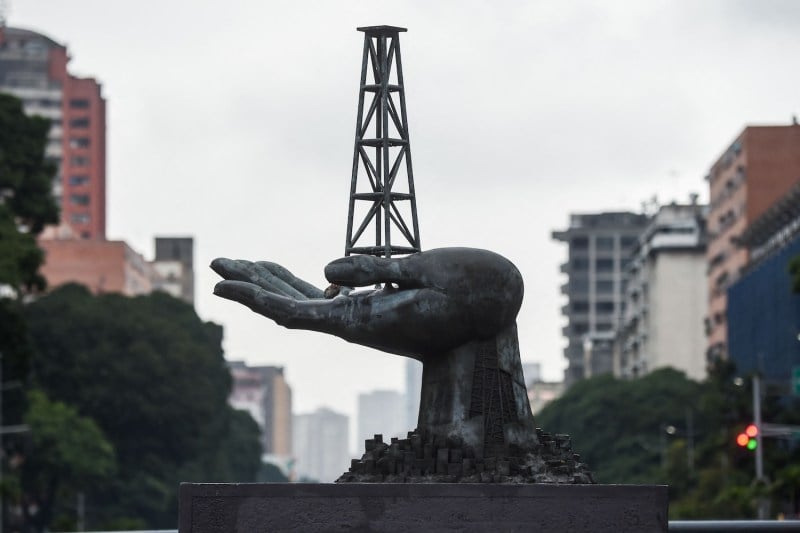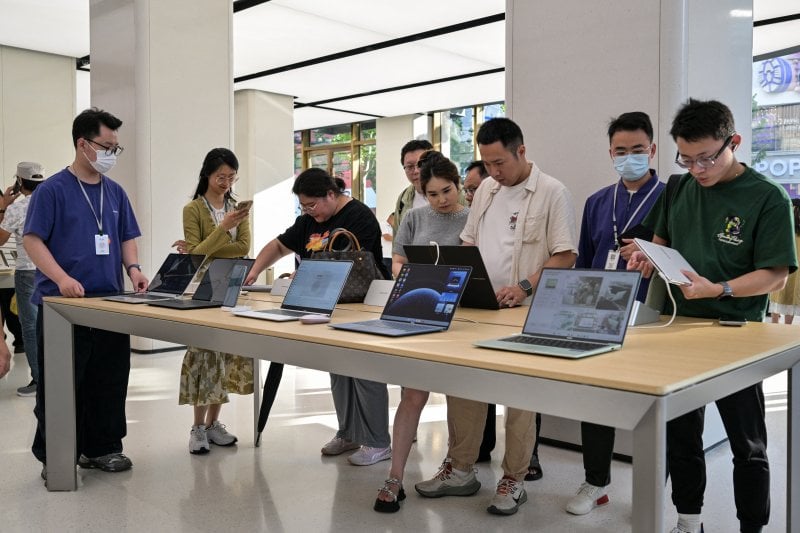South Korea’s Top Court Removes Yoon Suk-yeol From Power

South Korea’s Top Court Removes Yoon Suk-yeol From Power
The ruling ends a monthslong constitutional crisis and clears the way for a presidential election.
People in Seoul celebrate South Korea’s Constitutional Court ruling to remove impeached President Yoon Suk-yeol from office on April 4. Pedro Pardo/AFP via Getty Images
Welcome back to World Brief, where we’re looking at the removal of South Korean President Yoon Suk-yeol from power, the global economic fallout of U.S. reciprocal tariffs, and an expanded Israeli military operation in Gaza.
Yoon Removed as South Korean President
South Korea’s Constitutional Court ruled unanimously on Friday to uphold the impeachment of President Yoon Suk-yeol for his decision last December to invoke a short-lived martial law order, triggering a political crisis.
Welcome back to World Brief, where we’re looking at the removal of South Korean President Yoon Suk-yeol from power, the global economic fallout of U.S. reciprocal tariffs, and an expanded Israeli military operation in Gaza.
Yoon Removed as South Korean President
South Korea’s Constitutional Court ruled unanimously on Friday to uphold the impeachment of President Yoon Suk-yeol for his decision last December to invoke a short-lived martial law order, triggering a political crisis.
Yoon is guilty of “violating the constitutional order” and “betraying the people’s trust,” said Moon Hyung-bae, the acting president of the Constitutional Court. “He violated his duty to unite the society as the president of all the people, beyond just his own supporters.”
“I am regretful and sorry that I could not live up to your expectations,” Yoon said in response to the ruling, with his People Power Party adding that it “seriously and humbly accepts” the decision. Yoon is the country’s second conservative president in a row to be ousted by impeachment, after then-President Park Geun-hye in 2017.
On Dec. 3, 2024, Yoon ordered South Korean troops to seize the National Assembly, accusing the opposition of being “anti-state forces” that sought to paralyze the government by repeatedly trying to oust his top officials. It was the first time that a South Korean leader had used the military as a political tool since the country democratized in 1987.
The revolt was blocked within six hours, and on Dec. 14, the National Assembly impeached Yoon and suspended his presidential powers. Despite efforts to evade arrest, Yoon was detained a month later as part of a criminal investigation into whether he led an attempted insurrection. Yoon faces a separate criminal trial, to begin on April 14, on insurrection charges.
Friday’s ruling ends a monthslong constitutional crisis that exposed deep fissures in South Korean politics, and it clears the way for the country to move toward electing a new president. Under its constitution, South Korea must choose a successor within 60 days.
If a presidential election were held in South Korea today, polls find that the likely winner would be Lee Jae-myung, the leader of the opposition Democratic Party and its expected presidential nominee. “Today marks the beginning of a true South Korea,” Lee said on Friday in response to the Constitutional Court’s decision.
No strong front-runner has emerged from Yoon’s People Power Party, as his removal from office has only increased the chance that progressive forces regain power.
Until new elections can be held, acting President Han Duck-soo, whose own impeachment was overturned last week, must govern South Korea. Meanwhile, the country faces several foreign-policy challenges—from the United States’ trade war to growing military cooperation between North Korea and Russia.
Today’s Most Read
- Trump’s Wanton Tariffs Will Shatter the World Economy by Edward Alden
- Trump’s ‘Liberation Day’ Brings Even Bigger Tariffs Than Expected by Keith Johnson
- The Deep Familiarity of Donald Trump by Daniel Treisman
What We’re Following
U.S. tariff fallout. Global stock markets plunged for a second day following U.S. President Donald Trump’s decision on Wednesday to impose sweeping reciprocal tariffs on virtually all U.S. trading partners. U.S. markets recorded some of their steepest declines since the COVID-19 pandemic. By 3 p.m. EST on Friday, the S&P 500 index had dropped 6.8 percent, and the Nasdaq and Dow had fallen 5.25 percent and 4.78 percent, respectively.
European markets also suffered, with the pan-European STOXX index down 5.1 percent. And Japan’s Nikkei 225 fell 2.8 percent. By nearly every metric, “investors seem to expect the impact of Trump’s new tariffs to be a drag on growth, a boost to inflation, and especially bad news on both fronts for the United States,” FP’s Keith Johnson reported on Thursday.
Retaliatory measures continued into Friday, with China imposing 34 percent duties on all imports coming from the United States starting April 10. “This practice of the U.S. is not in line with international trade rules, seriously undermines China’s legitimate rights and interests, and is a typical unilateral bullying practice,” China’s State Council Tariff Commission said.
Israel’s operations in Gaza. Israeli forces expanded their control over northern Gaza on Friday, just days after Defense Minister Israel Katz announced plans to seize large areas of the territory. According to the United Nations’ humanitarian office, around 280,000 Palestinians have been displaced since Israel shattered its cease-fire deal with Hamas last month.
On Thursday, Israeli airstrikes killed at least 100 Palestinians across the Gaza Strip, including dozens sheltering at a school that Israeli forces said was a “Hamas command and control center.” Israel has repeatedly accused the militant group of operating out of civilian infrastructure. Gaza Health Ministry spokesperson Zaher al-Wahidi said the death toll from that attack is expected to rise.
Meanwhile, Turkey reiterated on Friday that it seeks no confrontation with Israel following Israeli strikes on military bases, including two airports, in Syria this week. Israel has accused Turkey of playing a “negative role” in Syria by assisting hostile forces there, but Ankara said the Israeli operations are fueling instability and are an encroachment on Syrian territory.
Aid delivery allegations. The United Nations accused Myanmar’s ruling junta on Friday of limiting humanitarian aid to survivors of the country’s deadly 7.7 magnitude earthquake. As of Thursday, the official death toll had surpassed 3,100 people, but local media report that the number of casualties is likely higher.
On Wednesday, Myanmar’s military declared a temporary cease-fire with armed rebel groups to bolster recovery and relief operations. But the U.N. Office of the High Commissioner for Human Rights (OHCHR) said on Friday that the junta was restricting aid supplies to communities that did not back the military’s rule. OHCHR also said it was investigating reported junta-led attacks, including 16 potentially conducted after the cease-fire began.
What in the World?
What did Russia discuss on Thursday with officials it hosted from Mali, Burkina Faso, and Niger?
A. Regional infrastructure support
B. Economic support in the form of loans
C. Increasing military ties
D. Increasing trade
Odds and Ends
It sounds like the subplot of a bad sitcom, but unfortunately, it’s local U.S. politics. Mayor Tom Ross of Minot, North Dakota, resigned on Tuesday after he mistakenly sent a “sexy video for his girlfriend” to City Attorney Stefanie Stalheim in January. The file was sent just minutes after Ross and Stalheim completed a phone call discussing a police officer’s suicide.
Ross reportedly made the video during his lunch break and told the city attorney to delete it and not mention the incident to anyone else; however, an investigator found that the mistaken delivery “created an offensive work environment.” Ross took full responsibility on Wednesday.
And the Answer Is…
C. Increasing military ties
Russia and China appear to be on a collision course in Africa, as each power pursues different—and contradictory—goals on the continent, Jessica Moody writes.
To take the rest of FP’s weekly international news quiz, click here, or sign up to be alerted when a new one is published.
Alexandra Sharp is the World Brief writer at Foreign Policy. X: @AlexandraSSharp
More from Foreign Policy
-

An illustration shows a golden Cybertruck blasting through a U.S. seal of an eagle holding arrows and laurel. Is America a Kleptocracy?
Here’s how life could change for the rich, poor, and everyone in between.
-

The flag of the United States in New York City on Sept. 18, 2019. America Is Listing in a Gathering Storm
Alarms are clanging at the U.S. geographic military commands around the globe.
-

U.S. President Donald Trump shakes hands with Supreme Court Chief Justice John Roberts during Trump’s inauguration in Washington, D.C. The U.S. Judicial Crisis Is Uniquely Dangerous
But other democracies provide a roadmap for courts to prevail over attacks from the executive branch.
-

An illustration shows a golden Newtons cradle with Elon Musk depicted on the one at left and sending a globe-motif ball swinging at right. Elon Musk’s First Principles
The world’s richest man wants to apply the rules of physics to politics. What could go wrong?







Join the Conversation
Commenting on this and other recent articles is just one benefit of a Foreign Policy subscription.
Already a subscriber?
.
Subscribe
Subscribe
View Comments
Join the Conversation
Join the conversation on this and other recent Foreign Policy articles when you subscribe now.
Subscribe
Subscribe
Not your account?
View Comments
Join the Conversation
Please follow our comment guidelines, stay on topic, and be civil, courteous, and respectful of others’ beliefs.
Change your username |
Log out
Change your username:
CANCEL
Confirm your username to get started.
The default username below has been generated using the first name and last initial on your FP subscriber account. Usernames may be updated at any time and must not contain inappropriate or offensive language.